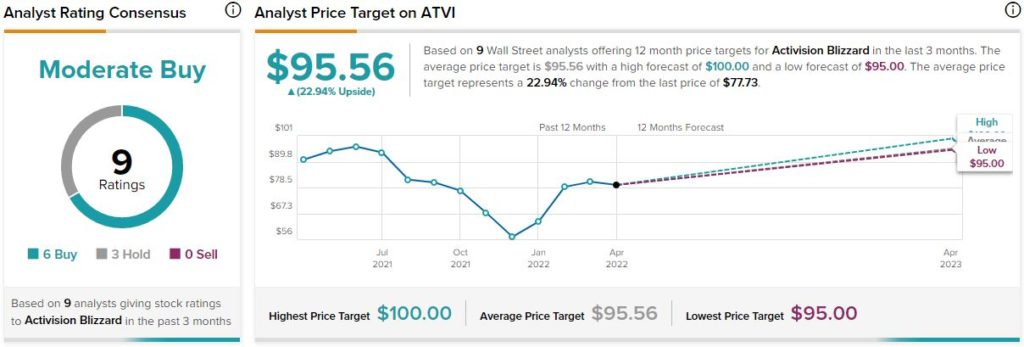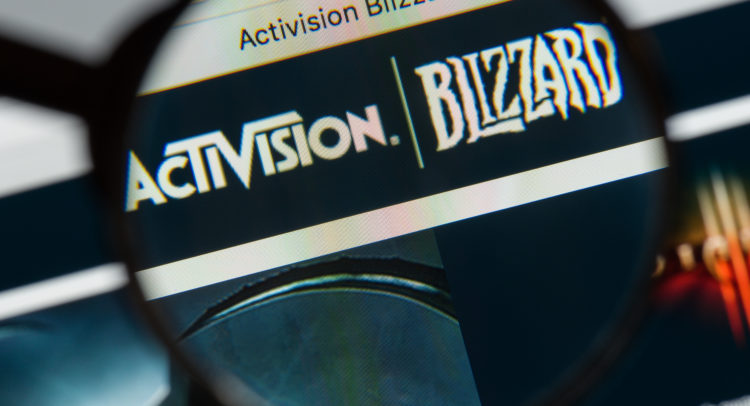Activision Blizzard (ATVI) is one of the biggest names around in modern video gaming. Home to a wide range of intellectual properties, this company has continually delivered some of the best games, from “Overwatch” to “Diablo” and the entire “Call of Duty” series. A recent revelation about its ownership, meanwhile, sent the stock climbing 2.9% in today’s trading session so far.
Stay Ahead of the Market:
- Discover outperforming stocks and invest smarter with Top Smart Score Stocks
- Filter, analyze, and streamline your search for investment opportunities using Tipranks' Stock Screener
I’m bullish on Activision Blizzard, thanks to its sheer range of properties. It certainly doesn’t hurt that it’s in a market that’s demonstrated itself recession-resistant, not to mention pandemic-resistant.
The last 12 months for Activision Blizzard featured a substantial decline, followed by a recovery that erased much of the decline. This time last year, Activision Blizzard was trading for just over $90 a share. By December, that was down almost half to around $56. Today, it’s up to around $78.
Meanwhile, the latest news proved a shot in the arm for the video game maker. Reports revealed that Berkshire Hathaway (BRK.B)—the massive conglomerate founded by the “Oracle of Omaha,” Warren Buffett—owned 9.5% of the company.
Buffett noted that the company had been buying Activision Blizzard ever since its deal with Microsoft. The Microsoft (MSFT) deal would see Microsoft buy Activision Blizzard completely for $95 per share.
Wall Street’s Take
Turning to Wall Street, Activision Blizzard has a Moderate Buy consensus rating. That’s based on six Buys and three Holds assigned in the past three months. The average Activision Blizzard price target of $95.56 implies 22.9% upside potential.

Analyst price targets range from a low of $95 per share to a high of $100 per share.
Warren’s Not Alone on Buying In, Says Investor Sentiment
For the most part, investor sentiment is overwhelmingly on Activision Blizzard’s side. However, Activision Blizzard’s own insiders seem not to think as highly of the company, but every other sentiment indicator seems bullish.
For example, the TipRanks 13-F Tracker reveals that hedge fund involvement regarding ATVI is on the rise – in a big way. Between September 2021 and December 2021, hedge funds better than doubled their involvement with Activision Blizzard. This is after a much smaller rise between June 2021 and September 2021, and that’s following five quarters of decline.

Retail investors—at least those who hold portfolios on TipRanks—are also backing Activision Blizzard in growing numbers. In the last seven days alone, TipRanks portfolios holding ATVI were up 0.3%. For the last 30 days, that figure has risen 2.6%.
About the only downside to investor sentiment comes from insiders. Insider trading shows a decline in confidence in the company. In the last three months, sell transactions have led buy transactions by six to two. In the last year, however, buying has been more heavily weighted. Buying transactions led selling transactions 28 to 11 since May 2021.
Finally, there’s the matter of Activision Blizzard’s dividend history. It’s behaving just like an income investor might like to see. ATVI pays its dividend regularly, and raises are regular as well.
The dividend nearly tripled from its levels in 2011. The pandemic seems to have only delayed the payment from its normal March date to its new April date.
A Leader in a Recession-Resistant Industry
I assert that the video game industry is recession-resistant. Others will go so far as to say “recession-proof.” Given that they were calling it this back in 2008—one of the darkest economic times seen in decades—that does carry some weight.
The basic weight behind such an assertion really only changes by degrees. When recessions emerge, people cut their spending to focus on necessities. Throw in the fact that inflation is spiking the prices of said necessities, and the need for substitute goods for entertainment spending only shifts.
We saw as much during the pandemic. People want to go out, but when governments forbid it, they need replacements. Video games stepped in to fill the gap.
Whether that gap is caused by a government mandate or by straitened circumstances, it’s still there. It should be filled in roughly the same way. Thus, with a recession likely coming, Activision Blizzard is in a good place, going forward.
Throw in the deal with Microsoft that’s likely to go through and hike shares significantly, and the value of Activision Blizzard only increases. Just look at the price targets; there’s a five-dollar range between its low and high target. Most analysts seem to expect this deal will go through.
If somehow, the deal falters, then there’s a much bigger problem at hand. Activision Blizzard’s release schedule looks, well, thin. Right now, reports point to a new “Call of Duty” installment as well as a mobile game in the “Warcraft” line for 2022. An early word about a “Diablo 4” release appears overly optimistic, as that’s now projected for a 2023 release “at the earliest.”
That’s a fairly thin bench. If that’s all Activision Blizzard has to go to the field with, then there could be problems ahead. Yet, again, there’s not exactly a strong case for Microsoft changing its mind.
Microsoft has been very aggressive with studio purchases of late, and the more studios it buys, the more console exclusives it can release. Microsoft has often been thin on console exclusives, so this certainly helps.
Concluding Views
I’m bullish on Activision Blizzard. It’s likely to end up as part of Microsoft soon. Microsoft is one of the biggest names around when it comes to gaming these days. With an industry that does pretty well in boom times and particularly well in bust times, the end result should prove positive for investors regardless of conditions.
Throw in positive investor sentiment almost all around—the recent term for insider trading has been a bit sell-weighted, though—and things look better still. When even Warren Buffett is willing to put that kind of investment into a gaming company, it can stand a second look.
Discover new investment ideas with data you can trust.
Read full Disclaimer & Disclosure



















